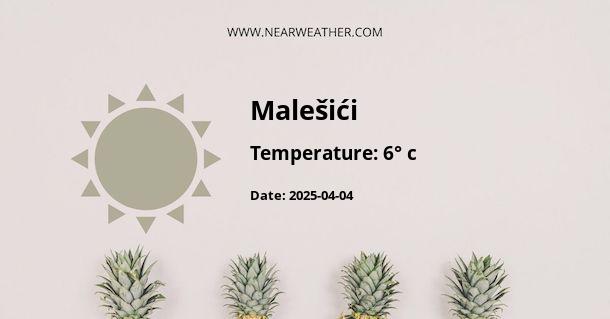Understanding the Climate and Weather Patterns in Malešići, Bosnia and Herzegovina
In the heart of the Balkans lies Malešići, a picturesque village located in Bosnia and Herzegovina. The climate of Malešići, like much of the Balkan region, falls under the category of a humid continental climate, as defined by the Köppen climate classification. This means the area experiences significant variations in temperature and precipitation between seasons. Let's delve into the specifics of the weather patterns you can expect in Malešići, supported by statistical information to provide an in-depth understanding of this location's year-round climate.
Seasonal Weather Overview
The weather in Malešići experiences four distinct seasons, each with its own characteristics:
Spring: Spring in Malešići generally brings increasing temperatures and a mix of sunny and rainy days. The season marks the transition from the cold winter to a warmer, more vibrant period.
Summer: Characterized by warm to hot temperatures, summer offers the most stable weather. It's typically the season with the highest tourism appeal due to the pleasant temperatures and reduced precipitation.
Autumn: Autumn sees a gradual decrease in temperatures and an increase in rainfall. The landscape is known for its vibrant colors, and the weather starts to cool down in preparation for winter.
Winter: Winters can be cold with snowfall, particularly in the higher elevations. Sub-zero temperatures are common, and the colder weather brings a different kind of beauty to the region.
Temperature Patterns
Temperature variability in Malešići can be significant throughout the year. The village can have extremely cold winters and fairly hot summers. The tables below provide average high and low temperature statistics for Malešići on a monthly basis.
| Month | Average High (°C) | Average Low (°C) |
|---|---|---|
| January | 3 | -3 |
| February | 6 | -2 |
| March | 10 | 1 |
| April | 15 | 5 |
| May | 20 | 10 |
| June | 24 | 13 |
| July | 26 | 15 |
| August | 26 | 14 |
| September | 22 | 11 |
| October | 16 | 6 |
| November | 10 | 2 |
| December | 5 | -1 |
As evident from the table above, the warmer period spans from May to September, with peak temperatures commonly occurring in July and August. Conversely, the colder period occupies the months from November to March, with January and February often being the coldest.
Precipitation Patterns
Rainfall in Malešići follows a relatively common pattern, with a noticeable peak during the late spring and early summer months. Snowfall is predominantly a feature of the winter months. In the chart below, we present the average monthly precipitation in Malešići:
- January - 70 mm
- February - 65 mm
- March - 70 mm
- April - 75 mm
- May - 85 mm
- June - 90 mm
- July - 80 mm
- August - 75 mm
- September - 80 mm
- October - 80 mm
- November - 85 mm
- December - 80 mm
The data indicates a relatively even distribution of precipitation throughout the year, with a slight increase during late spring and early autumn. Snowfall usually peaks in January and February, aligning with the colder temperatures and creating picturesque winter landscapes.
Humidity and Wind
The humidity levels in Malešići are fairly consistent owing to the continental climate, with higher humidity typically present during the colder months. The wind patterns in the region are not particularly extreme but can be influenced by the topography and the larger weather systems passing through the Balkans.
Seasonal Activities and Considerations
The diverse climate in Malešići offers ample opportunities for various seasonal activities:
- Winter: Skiing, snowboarding, and enjoying the winter festivities are popular, especially if one is willing to venture to nearby mountains such as the Olympic-grade facilities in Jahorina and Bjelašnica.
- Spring: A great time for hikers and nature enthusiasts, as the natural landscapes come to life with blooming flowers and lush greenery.
- Summer: Ideal for exploring the outdoors, whether it's rafting on the Neretva River, visiting cultural sites, or simply enjoying the urban environment of Sarajevo and other cities.
- Autumn: Offers a visual treat with the changing foliage, and the cooler weather is perfect for outdoor adventures without the summer heat.
Climate Change Considerations
The effects of climate change on the weather patterns of Malešići are an ongoing concern. Increases in extreme weather events, such as heatwaves and heavy precipitation, can be expected. Changes in the duration of seasons, especially milder winters and longer, drier summers, could potentially alter the local ecosystems and the human activities they support.
Final Thoughts
Malešići offers a varied climate that changes significantly with the seasons. Understanding these patterns is crucial for visitors and residents alike to make the most of the area's natural beauty. Whether planning travel, partaking in seasonal sports, or engaging in agricultural practices, being aware of the typical weather conditions can lead to a more enjoyable and productive experience in Malešići, Bosnia and Herzegovina.
A - Malešići's Latitude is 44.738060 & Longitude is 18.273890.
A - Weather in Malešići is 14° today.
A - Climate Conditions in Malešići shows few clouds today.
A - Humidity in Malešići is 50% today.
A - Wind speed in Malešići is 13.72 km/h, flowing at 67° wind direction. today.
